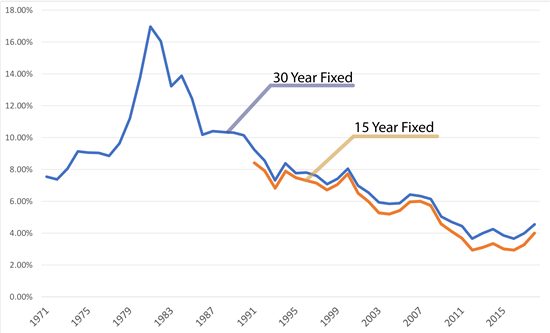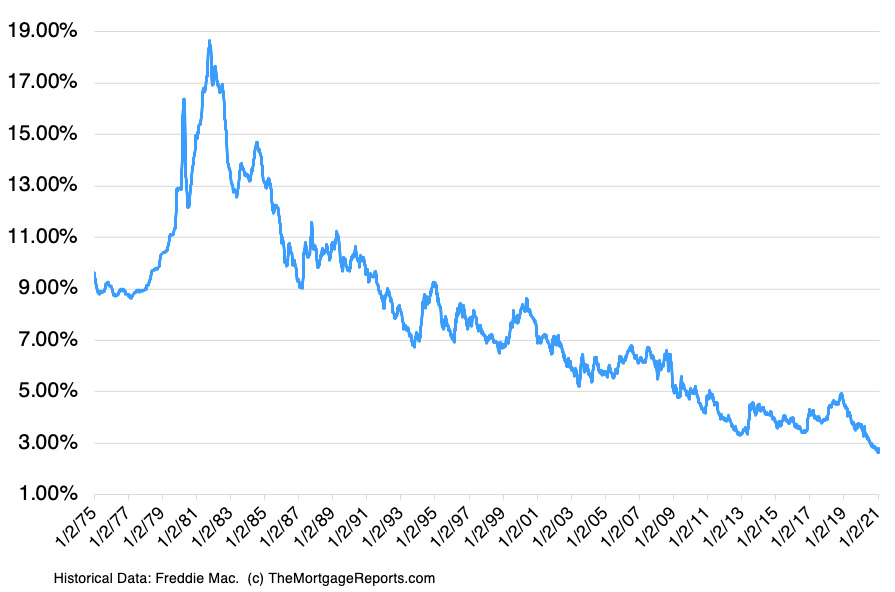Nevertheless, mortgage-backed securities costs tend to increase at a decreasing rate when bond rates are falling; in turn, their costs tend to reduce at an increasing rate when rates are increasing. This is understood as unfavorable convexity and is one factor why MBSs use greater yields than U.S. what is the going rate on 20 year mortgages in kentucky. Treasuries. Mortgage-backed securities are often used to hedge the total risk of an investor's set income portfolio due to negative convexity.

It needs to be noted that mortgage-backed securities tend to create their finest relative efficiency when prevailing rates are stable. Mortgage swimming pools can be created by personal entities (for the most part) or by the three quasi-governmental companies that issue MBSs: Government National Home loan Association (referred to as GNMA or Ginnie Mae), Federal National Home Mortgage (FNMA or Fannie Mae), and Federal Home Mortgage Home Mortgage Corp.
The most succinct description of the distinctions amongst the three originates from the U.S. Look at this website Securities and Exchange Commission (SEC): "Ginnie Mae, backed by the complete faith and credit of the U.S. federal government, guarantees that investors get timely payments. Fannie Mae and Freddie Mac likewise provide particular assurances and, while not backed by the complete faith and credit of the U.S.
Treasury. Some personal organizations, such as brokerage firms, banks, and homebuilders, give away timeshare also securitize home mortgages, referred to as "private-label" home mortgage securities." MBSs backed by Ginnie Mae aren't at threat of default, however there is a little degree of default danger for a bond provided by Fannie Mae and Freddie Mac. Still, Freddie and Fannie's bonds have a stronger aspect of backing than they appear to given that both were taken control of by the federal government in the wake of the 2008 financial crisis.
Many financiers who own a broad-based bond shared fund or exchange-traded fund have some exposure to this sector because it is such a large portion of the markettherefore it is one that is heavily represented in varied funds. Financiers can also select funds that are devoted exclusively to MBSs.
The How Is The Average Origination Fees On Long Term Mortgages PDFs

Our ideas at California Pools & Landscape are with everyone who has actually been affected by the Coronavirus. Our clients and employees are our primary top priority and as such, we are adapting to preserve our high quality of service in the safest possible method. Here is how we have adjusted our operations to more safely satisfy the requirements of our customers: Online conferences with designers.
Correct operation, maintenance, and disinfection (e. g., with chlorine and bromine) of pools and hot tubs should get rid of or suspend the infection that causes COVID-19.
A Mortgage-backed Security (MBS) is a debt security that is collateralized by a home loan or a collection of home loans - what is the going rate on 20 year mortgages in kentucky. An MBS is an asset-backed security that is traded on the secondary marketOption Financial Investment Market (GOAL), and that enables financiers to benefit from the home mortgage service without the need to directly purchase or sell mortgage.
A mortgage contained in an MBS needs to have originated from an authorized banks. When an investor purchases a mortgage-backed security, he is essentially providing cash to house purchasers. In return, the investor gets the rights to the value of the home mortgage, including interest and principal payments made by the borrower.
The bank serves as the intermediary between MBS financiers and home buyers. Normal purchasers of MBS consist of specific investors, corporationsCorporation, and institutional financiers. There are 2 basic types of mortgage-backed security: and. The pass-through mortgage-backed security is the easiest MBS, structured as a trust, so that principal and interests payments are passed through to the financiers.
The Best Guide To For Mortgages How Long Should I Keep Email
The trust that sells pass-through MBS is taxed under the grantor trust rules, which determines that the holders of the pass-through certificates should be taxed as the direct owners of the trust apportioned to the certificate. Collateralized mortgage obligations comprise numerous pools of securities, also referred to as tranches. Each tranche comes with different maturities and top priorities in the receipt of the principal and the interest.
The least dangerous tranches offer the lowest interest rates while the riskier tranches come with higher rates of interest and, therefore, are generally more chosen by investors. When you want to purchase a home, you approach a bank to offer you a home loan. If the bank validates that you are creditworthy, it will transfer the cash into your account.
The bank might select to collect the principal and interest payments, or it might opt to sell the mortgage to another monetary institution. If the bank chooses to sell the home loan to another bank, government institution, or private entity, it will use the proceeds from the sale to make new loans.
It then sells these mortgage-backed securities to interested financiers. It uses the funds from the sale to buy more securities and drift more MBS outdoors market. As a response to the Great Anxiety of the 1930s, the government developed the Federal Real estate Administration (FHA) to help in the rehabilitation and building and construction of property houses.
In 1938, the federal government created Fannie Mae, a government-sponsored agency, to buy the FHA-insured home mortgages. Fannie Mae was later split into Fannie Mae and Ginnie Mae to support the FHA-insured home loans, Veterans Administration, and Farmers House Administration-insured mortgages., In 1970, the government produced another agency, Freddie Mac to carry out comparable functions to those performed by Fannie Mae.
The Best Guide To What States Do I Need To Be Licensed In To Sell Mortgages
They likewise guarantee prompt payments of principal and interest on these mortgage-backed securities. Even if the initial customers stop working to make prompt payments, both institutions still make payments to their financiers. The government, however, does not guarantee Freddie Mac and Fannie Mae. If they default, the government is not obliged to come to their rescue.
Unlike the other two companies, Ginnie Mae does not purchase MBS. Hence, it features the most affordable threat among the 3 firms. Low-quality mortgage-backed securities were among the factors that caused the monetary crisis of 2008. Although the federal government regulated the financial institutions that produced MBS, there were no laws to directly govern MBS themselves.
If the debtors of home loan defaulted, there was no sure method to compensate MBS financiers. The marketplace brought in all types of home mortgage lenders, consisting of non-bank banks. Conventional loan providers were required to decrease their credit requirements to contend for house loan organization. At the same time, the U.S. government was pressuring lending institutions to extend home loan funding to greater credit danger customers.
Lots of customers simply got into home mortgages that they ultimately could not manage. With a constant supply of, and increasing need for, mortgage-backed securities, Freddie Mac and Fannie Mae strongly supported the market by providing a growing number of MBS. The MBS created were progressively low-grade, high-risk investments. When home loan debtors started to default on More helpful hints their responsibilities, it caused a domino effect of collapsing MBS that eventually eliminated trillions of dollars from the US economy - the big short who took out mortgages.
We hope you delighted in checking out CFI's guide to a mortgage-backed security. CFI provides the Financial Modeling & Valuation Analyst (FMVA)FMVA Accreditation certification program for those wanting to take their careers to the next level. To keep knowing and advancing your career, the list below resources will be helpful:.